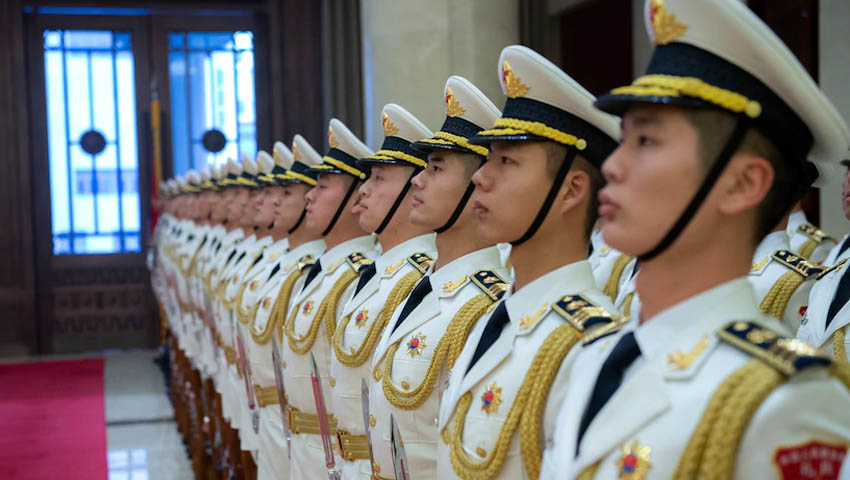Is Beijing’s intimidation of Taipei a prelude to war or merely a signal to the West? Former US presidential candidate Patrick Buchanan weighs in.
Taiwan’s Ministry of National Defence recently reported a spike in PLA activity over the country’s south-west air defence identification zone, with 14 incidents recorded since the start of October.
This has included the detection of Shenyang J-16 and Sukhoi SU-30 fighter jets, Shaanxi Y-8 ASW maritime patrol aircraft, Shaanxi KJ-500 airborne early warning and control (AEW&C) aircraft, and Xian H-6 bombers.
In response, the Taiwanese military has deployed combat air patrol platforms, issued radio warnings, and prepared air defence missile systems.
The surge in military activity has sparked fears of an imminent conflict, with US Secretary of State Antony Blinken condemning the Chinese Communist Party’s (CCP) “provocative military activity”.
“As we’ve said, the activity is destabilising, it risks miscalculation, and it has the potential to undermine regional peace and stability,” Secretary Blinken said.
“So, we strongly urge Beijing to cease its military, diplomatic, and economic pressure and coercion directed at Taiwan.”
Blinken reaffirmed the United States’ “rock solid” commitment to Taiwan, which he said has contributed to the “maintenance of peace and stability”.
“[We] will continue to stand with friends, with allies to advance shared prosperity, shared security, shared values, as well as continue to deepen our ties with a democratic Taiwan,” he added.
The Secretary of State went on to urge Beijing to refrain from taking unilateral actions that “change the status quo by force”.
But what are Beijing’s next steps? Will it realise its takeover ambitions?
According to former US presidential candidate Patrick Buchanan — who also served as White House communications director in the Reagan administration — the CCP’s intimidation tactics are a firm signal to the United States and its regional allies.
“This is an unmistakable message to America that, about Taiwan, Beijing is serious,” he writes.
“China is warning the US and its allied and associated powers — Australia, Japan, India — that it will, in the last analysis, fight to prevent an independent Taiwan.”
Buchanan contends that a US military response would be all but assured, given the hit to its credibility following the Biden administration’s clumsy Afghanistan withdrawal.
“If after the fall of Afghanistan and the humiliation of the US defeat and departure, the US abandoned Taiwan, US credibility would be shot in Asia,” he writes.
“Asia and the world would conclude that China owned the future.”
Similarly, Beijing would be quick to exert force, given its “well-established record”.
“China started and finished the recent war in the Himalayas with India. It warned Hong Kong to stifle the democracy protests that went violent in 2019. When Hong Kong failed to do so, Beijing acted and is now completing the full absorption of the city into the mainland,” Buchanan writes.
He warns that the CCP has demonstrated its willingness to follow through with its threats.
“Of all the islets and reefs in the South China Sea it has taken from Vietnam, the Philippines and other neighbours, China has surrendered not a one,” he notes.
“Though charged with genocide against the Uyghurs, it has persisted in its persecution, as it has in its suppression of Tibetans and Christians.
“Chinese President Xi Jinping and his party are unapologetic about their Communist values and Marxist beliefs.”
But Buchanan argues Beijing’s attempts to undermine Taiwanese sovereignty are not necessarily a prelude to an imminent invasion or attack.
An all-out conflict, he adds, would be too costly for all parties involved.
“For such an attack would risk a US response in east Asia and a political and diplomatic confrontation if not a military one,” Buchanan continues.
“The impact on the world economy of a collision between the world's largest militaries and the world's largest economies would be devastating.
“The stakes involved here are huge, but who would benefit from such a war?”
Buchanan references a swathe of domestic issues threatening China.
“China has its problems, none of which would be solved and all of which would be exacerbated by any major clash with the United States,” he writes.
“China is facing energy shortages and blackouts from a lack of fuel for its coal-fired power plants, its primary source of energy.
“After decades of a ‘one couple, one child’ policy, China is facing a demographic crisis. In parts of the country, deaths now exceed births. China's women have a fertility rate below replacement levels. China is ageing and shrinking, and declining populations correspond with declining powers.”
The US, he adds, would be equally devastated by a conflict with China, given it would likely bear the military burden for its allies.
“China will never relinquish its claim to Taiwan, whose independence is recognised today by only a handful of nations,” Buchanan explains.
“China is a nation many fear and respect, but whose regime few see as a friend. For Beijing has historic claims in every direction — on lands held by Russia and India, and to islands and reefs claimed by Vietnam, Malaysia, Singapore, Brunei, the Philippines and Japan.
“It has a claim on Taiwan and on all the islands Taiwan claims in the East and South China Seas.”
He concludes: “Yet, though facing the world's most menacing power 100 miles away, Taiwan, as of 2019, was still spending less than 2 per cent of GDP on defence.
“Refusing to invest in your own defence, and relying on America to come and fight your wars, seems to be a tradition with America's allies.”
Get involved with the discussion and let us know your thoughts on Australia’s future role and position in the Indo-Pacific region and what you would like to see from Australia's political leaders in terms of partisan and bipartisan agenda setting in the comments section below, or get in touch with


